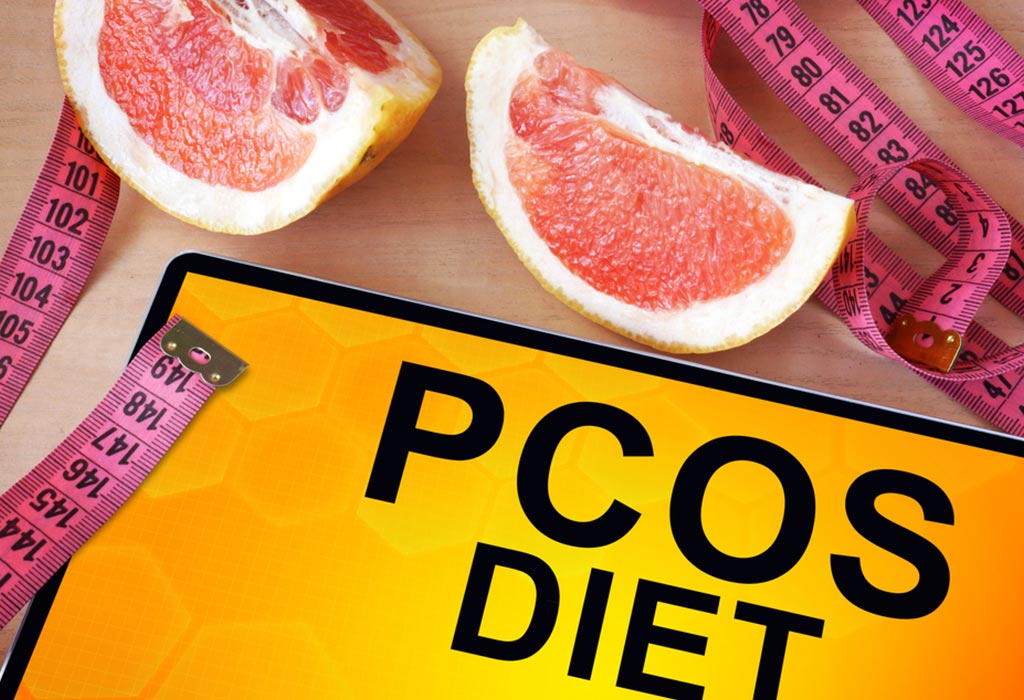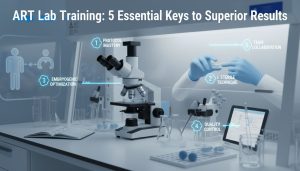Polycystic ovary syndrome, or PCOS, is a common hormonal condition in women. Women with PCOS may have a hard time getting pregnant with PCOS and are at higher risk of developing complications during pregnancy. However, by managing symptoms, many women with PCOS getting pregnant and have a healthy baby.
What is PCOS?
PCOS is a condition in which the ovaries produce higher than normal levels of male hormones (androgens). This can affect a woman’s menstrual cycle, fertility, and appearance. Symptoms of PCOS include:
- irregular menstrual periods
- cysts on the ovaries
- sterility
- weight gain
- acne
- excess facial and body hair
- thinning or balding hair
- insulin resistance
Diagnosis
It often takes time for women with PCOS to get a firm diagnosis, as the condition can mimic other problems. Sometimes women who have trouble getting pregnant find out they have PCOS.
If you think you might have PCOS, it’s important to see your doctor find the cause of your symptoms. With early diagnosis, the symptoms of polycystic ovary syndrome can be treated early. This reduces the risk of complications if you decide to get pregnant.
At your appointment, your doctor:
- talk to you and examine you
- get a blood test to check for male hormones
- organize ultrasounds to look for cysts on the ovaries

PCOS and infertility
If you have PCOS, you may have a hard time getting pregnant. This is because high levels of male hormones prevent the release of an egg (ovulation).
You can increase your chances of getting pregnant by:
- Be at a healthy weight: Even a 5-10% weight loss has been shown to significantly increase your chances of getting pregnant.
- healthy nutrition
- exercise
- monitor ovulation and schedule sexual intercourse around ovulation
If you’ve made some changes and it hasn’t helped yet, your doctor may order fertility tests and prescribe fertility drugs to help you ovulate.
If medications don’t work, your doctor might suggest surgery to remove a small amount of tissue that makes excess male hormones from your ovaries. Another option is in vitro fertilization (IVF), which offers the best chances of conception. However, this can be expensive and is usually only considered when all other options have not been successful.
Fortunately, with lifestyle changes or infertility treatment, most women with PCOS become pregnant.
Weight loss to restart ovulation
Many (but not all) women with PCOS struggle with obesity. This is because PCOS negatively affects the way your body processes insulin, which, in turn, can lead to weight gain. One of the main reasons that women with PCOS cannot conceive is that they do not ovulate or do not ovulate regularly. Women with polycystic ovary syndrome who are overweight are more likely to experience more severe anovulation, spending months between periods.

Studies have found that losing some weight can bring ovulation back. According to research, losing 5% to 10% of your current weight may be enough to jump-start your menstrual cycles. Unfortunately, there isn’t much evidence that losing weight helps you conceive on your own. You may still need fertility drugs. Research has found that women who have lost weight have a high chance of being successful PCOS treatment for getting pregnant.
Losing weight is not easy for anyone, and it can be even more difficult for people with PCOS. Also, not all women with PCOS are overweight. If that is your situation, weight loss is not a solution to help with fertility.
Diet, exercise, and polycystic ovary syndrome
Eating a healthy diet is important for women with PCOS. This is partly due to the increased risk of being overweight and partly due to their bodies’ problems with regulating insulin. Is there a PCOS diet to get pregnant naturally? That is a matter of debate. Some studies have claimed that a low-carbohydrate diet is best for PCOS, 4 but other studies have not found a low-carbohydrate benefit. The most important thing is to make sure your diet is rich in foods rich inadequate nutrients and protein and low in foods high in sugar. Avoiding junk food and processed foods are your best option.

Regular exercise has also been found to help PCOS symptoms. In one study, a combination of regular brisk walking and a healthier diet improved menstrual cycle regularity by 50%. It is not clear if diet and exercise alone will help you conceive. However, a healthy lifestyle can help your fertility treatments work better and will undoubtedly help you feel better overall. Like weight loss, it’s worth the effort if you want to get pregnant.
Medicines
Some people with PCOS will need medicine to treat the condition and/or help them conceive.
Metformin
Ask your doctor to test your insulin levels. If you are insulin resistant, taking the diabetes drug metformin can treat insulin resistance and may help you lose weight.5 It can also help you conceive. Metformin is sometimes prescribed for people with polycystic ovary syndrome even if they are not actually insulin resistant. The use of metformin for PCOS is considered off-label use. However, the drug is relatively safe and can help you conceive. According to research, metformin can:
- Promote weight loss
- Restart regular menstrual cycles
- Improve the effectiveness of some fertility drugs.
- Reduce the rate of PCOS miscarriage and getting pregnant again (in those with repeat miscarriages)
Can Metformin Alone Help You Get Pregnant? It is unlikely. While earlier research found that metformin increased a woman’s chances of ovulating on her own, later studies found no increase in pregnancy or live birth rates.7 In other words, improvement with ovulation did not lead to an increase in infertility.
Clomid
Clomid is the most widely used fertility drug overall, and also the most widely used PCOS treatment for getting pregnant for women. Many women with PCOS will conceive on Clomid. Unfortunately, not all are successful. Some women with PCOS will experience resistance to Clomid. This is when Clomid doesn’t trigger ovulation as expected. Studies have found that a combination of metformin and Clomid can help overcome resistance to Clomid.

Letrozole
If metformin and Clomid are unsuccessful, your doctor may consider the drug letrozole. Also known by its brand name Femara, it is not a fertility drug but is frequently used as such in women with PCOS. Letrozole is actually an anticancer drug. However, studies have found that it may be more effective than Clomid in stimulating ovulation in women with PCOS.
Don’t be scared off by the fact that the drug was originally designed as an anticancer drug. Side effects are relatively mild, and there has been a lot of research in women trying to conceive.
Gonadotropins
If Clomid or letrozole is unsuccessful, the next step is injectable fertility drugs or gonadotropins. Gonadotropins are made from the hormones FSH, LH, or a combination of the two. The brands you may recognize are Gonal-F, Follistim, Ovidrel, Bravelle and Menopur.
Your doctor may suggest a combination of oral and injectable fertility drugs (for example, Clomid with an LH-activating injection mid-cycle). Another possibility is a gonadotropin-only cycle. Or your doctor may suggest gonadotropins with an IUI (intrauterine insemination) procedure. IUI involves placing specially washed semen directly into the uterus through a catheter. The semen can be from a sperm donor or from your partner.
One of the possible risks of gonadotropins is ovarian hyperstimulation syndrome (OHSS). This is when the ovaries overreact to the fertility drug. If left untreated or severe, it can be dangerous. Women with polycystic ovary syndrome are at increased risk of developing OHSS10. Your doctor may use lower doses of injectable fertility drugs to avoid this. Ideally, your doctor should use the lowest effective dose. During treatment, if you have any symptoms of OHSS (such as rapid weight gain, abdominal pain, bloating, or nausea), be sure to tell your doctor.
Fertility procedures
If the gonadotropins are not successful, the next step is IVF (in vitro fertilization) or IVM (in vitro maturation). You have probably already heard of IVF. It involves the use of injectable fertility drugs to stimulate the ovaries to supply a good number of mature eggs. Eggs are removed from the ovaries during a procedure known as egg retrieval.
These eggs are then placed together with the sperm in Petri dishes. If all goes well, the sperm will fertilize some of the eggs. Once the fertilized eggs have had three to five days to divide and grow, one or two are transferred to the uterus. This procedure is known as embryo transfer. Two weeks later, your doctor will order a pregnancy test to see if the cycle was successful or not.
As with gonadotropin treatment alone, one of the risks of IVF, especially in women with PCOS, is overstimulation of the ovaries. That’s where IVM comes in.
IVM stands for in vitro maturation. Rather than giving you high doses of fertility drugs to force your ovaries to mature many eggs, with IVM you receive either no or very low doses of fertility drugs. The doctor removes immature eggs from the ovaries and then matures them in the laboratory. IVM is not offered in all fertility clinics. This is something to keep in mind when choosing a fertility clinic.

What are the chances of conceiving with PCOS?
Although statistics are difficult to give because cases vary widely and different treatments have different success rates, most women with PCOS will be able to have a baby with fertility treatment. For women under the age of 35, this is, even more, the case.
Mental health and polycystic ovary syndrome
Finding out that you have fertility problems can be a real shock, and feelings of guilt and failure are not uncommon. However, if you can, consider it a medical problem that can be treated alongside most other conditions, and not a reflection of you as a woman. Many, many couples use fertility treatment to conceive and the inconvenient start is forgotten in later years.
For some couples, working with different treatments works is a long, complicated and anxious process, especially when combined with having to take time off in an unfriendly workplace. Try to support yourself as much as possible through consultations, treatments, and appointments.
PCOS and breastfeeding
If you are diagnosed with polycystic ovary syndrome, you may need to continue to monitor your symptoms even after pregnancy. But the symptoms and severity can vary. Sometimes hormonal fluctuations after pregnancy and breastfeeding can change symptoms, so it may take a while before you adjust to your new “normal.”
It is safe to breastfeed with PCOS, even if you are taking insulin medications to help control your blood sugar. Women who have gestational diabetes are at risk of developing type 2 diabetes later in life, but breastfeeding can help lower that risk.
Breastfeeding has many benefits for both you and your baby, so if it suits your family, be sure to explore the options and resources available so that you can have a successful breastfeeding experience.
PCOS and pregnancy
Having PCOS can increase your risk for some complications during pregnancy, such as:
- spontaneous abortion
- pregnancy-induced high blood pressure
- gestational diabetes
- premature birth
Women with PCOS are also more likely to need a cesarean delivery because their babies may be larger than expected for their gestational age. Babies born to women with PCOS are at increased risk of dying at the time of delivery and of being admitted to a neonatal intensive care unit.

If you have PCOS and are pregnant, it is important to talk to your doctor. The risk of these complications can be reduced by controlling the symptoms of PCOS and taking special care during pregnancy.
Hence, Women with PCOS are at increased risk for adverse pregnancy and delivery outcomes and may need increased vigilance during pregnancy and delivery. There is no evidence of the benefit of metformin in treating these pregnancy complications pending further review of well-powered randomized placebo-controlled trials.
Conclusion
However, home insemination is one of the ways through which you can get pregnant with PCOS and also without any risk of failure as well. And also without any type of other diseases as well. Home Insemination is becoming the latest trend and helps for those couples who are true of a baby. But they are scared of the infections and diseases which they would face in their life.
One of the main advantages of performing insemination at home is the relief, security, and perfect planning it gives. It additionally permits you to utilize new as opposed to putting away sperm if your accomplice is included, which can make a more private encounter also. Home insemination further lessens the pressure, reactions, and cost-related with setting off to a facility for the method.
Hence, home insemination is one of the safest ways from which you can easily invite a new child in your home without even thinking of taking it as a risk while having PCOS.





